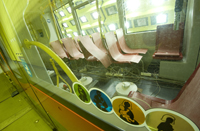
EcoTram - a research project for the enhancement of the environment
Today’s passengers expect to travel in comfort on public transport equipped with modern technology and air-conditioning - but currently this means high energy consumption. The EcoTram research project has been launched to create a connection between comfort and energy efficiency. A consortium formed of Wiener Linien, Siemens, Vossloh Kiepe, Rail Tec Arsenal and SCHIG mbH has initiated the EcoTram research project to achieve this goal under the leadership of the Vienna University of Technology. The project partners aim to set new standards in energy efficiency for rail vehicles. Due to its contribution to climate protection, the EcoTram project will receive funding from the Climate and Energy Fund under the Austrian Research Promotion Agency’s “NEW ENERGIES 2020” programme.

Substantial energy savings
Buses, trams and subways in Vienna consume far less energy than motorised private transport. The EcoTram project is designed to further cut down on the energy demand of public transport in order to help achieve the city’s climate change goals. The possible energy saving potential for 300 trams with an average annual consumption of 100,000 kWh per vehicle could be as much as 3 million kWh, which is equivalent to the annual energy consumption of a small town with a population of around 3,000 inhabitants and about 1,200 households. This represents a potential 600,000 kg reduction in annual CO2 emissions.
New projects in this field aim to transfer the findings from applied research to industry and establish the technological advance as standard, thereby lowering development and procurement costs and driving the implementation of energy efficient technology at the European level.
RTA is an internationally acknowledged centre of expertise for climatic tests of rail vehicles and is thus committed to advancing research in the area of heating, ventilation and air-conditioning by initiating projects such as EcoTram.
The task of Rail Tec Arsenal within this project is to measure the energy consumption of the air-conditioning and heating systems of the ULF ultra-low floor tram operating in Vienna under different climatic and operating conditions. The climatic wind tunnel provides the unique opportunity to measure the relevant parameters under reproducible conditions. In a second step, data are also recorded during service operation. This comprehensive data base allows relationships to be established between ambient conditions, operating parameters, the vehicle body and the air-conditioning and heating systems.
These findings provide the basis for the development of a scientifically sound simulation program designed to test individual optimisation steps for their feasibility. Final analysis of the project results is expected to indicate potential for substantial operational energy savings.
EcoTram II - evaluation and results
The continuative project EcoTram II got the tender accepted and received funding from the Climate and Energy Fund under the Austrian Research Promotion Agency’s “NEW ENERGIES 2020” programme as well.
The main goal of EcoTram II was the evaluation of selected measures for the prototype. The operational energy savings were validated in real service. The achieved energy savings could be quantified in real service at the ULF on line 62 in Vienna during a mesurement period of nearly one year.
The result shows an energy reduction of 13% related to the HVAC-system. cf. "Ecotram – Verbesserung der Energieeffizienz im Bereich der thermischen Konfortsysteme", ETR, (September issue 9/2014, page 156-160) by Richter G. (RTA) und Struckl W. (Siemens)




